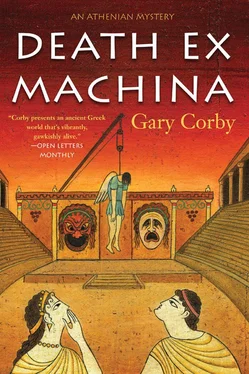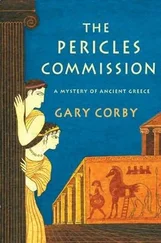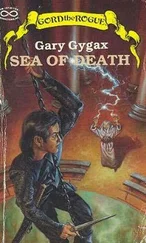Gary Corby - Death Ex Machina
Здесь есть возможность читать онлайн «Gary Corby - Death Ex Machina» весь текст электронной книги совершенно бесплатно (целиком полную версию без сокращений). В некоторых случаях можно слушать аудио, скачать через торрент в формате fb2 и присутствует краткое содержание. Год выпуска: 2015, ISBN: 2015, Издательство: Soho Press, Жанр: Исторический детектив, на английском языке. Описание произведения, (предисловие) а так же отзывы посетителей доступны на портале библиотеки ЛибКат.
- Название:Death Ex Machina
- Автор:
- Издательство:Soho Press
- Жанр:
- Год:2015
- ISBN:978-1-61695-520-5
- Рейтинг книги:3 / 5. Голосов: 1
-
Избранное:Добавить в избранное
- Отзывы:
-
Ваша оценка:
- 60
- 1
- 2
- 3
- 4
- 5
Death Ex Machina: краткое содержание, описание и аннотация
Предлагаем к чтению аннотацию, описание, краткое содержание или предисловие (зависит от того, что написал сам автор книги «Death Ex Machina»). Если вы не нашли необходимую информацию о книге — напишите в комментариях, мы постараемся отыскать её.
Death Ex Machina — читать онлайн бесплатно полную книгу (весь текст) целиком
Ниже представлен текст книги, разбитый по страницам. Система сохранения места последней прочитанной страницы, позволяет с удобством читать онлайн бесплатно книгу «Death Ex Machina», без необходимости каждый раз заново искать на чём Вы остановились. Поставьте закладку, и сможете в любой момент перейти на страницу, на которой закончили чтение.
Интервал:
Закладка:
We finally found Stephanos at work in a house in the deme of Agryle. There was no trouble getting in to see him. The front door was wide open. Tradesmen streamed in and out with their tools and materials in hand.
I stopped one of the men, to ask him what was happening and where I might find the painter. It seemed the home owner was renovating. He’d moved his family elsewhere while his home was stripped to its bare beams and rebuilt from the ground up.
Inside, I paid close attention to what the workmen were doing. I counted no fewer than twenty of them. Carpenters cut away and replaced walls. One man was tearing up the treads of the stairs to replace the old wood. Stone workers laid new paving in the courtyard. Two thatchers stood in the courtyard and stared straight up, pointing at this or that as they discussed how they would replace the roof.
This was what I wanted to do to Diotima’s house, but could never afford unless I did it myself. The mere sight of all the work involved depressed me. On my own it would take ten years, or maybe a hundred.
We followed the tradesman’s directions to the only room that was complete: the master’s bedroom, to the left off the courtyard. The room had that new wood smell that makes you want to breathe deep. But it was mixed with an aroma that was even sweeter. It smelled like honey.
A thin man of medium height stood with his back to us, bent over pans. He wore an exomis spattered with colors that ranged from faded pastel yellow to recent hits of vibrant red and blue. It could have been a bright party dress, except the paint was crusted hard.
This must be the artist.
“Stephanos of Vitale? My name is Nicolaos, son of Sophroniscus. I have a few questions to ask-”
“They’ll have to wait. I’m working.”
He hadn’t even turned to speak to us.
Stephanos pulled a sponge from the small brazier over which he leaned. The brazier stood upon a tripod. A gentle fire lapped at the metal from an oil lamp placed beneath. A layer of something sticky coated the sponge in the artist’s hand.
“What’s that?” Diotima asked.
“Beeswax.”
He began to wipe the sponge across the wall in broad, easy strokes. When the sponge ran out of wax he dipped it back in the brazier for more. He continued this way until the wall was coated top to bottom and side to side in a wax undercoat. Stephanos seemed to use a lot of beeswax. Were there really that many bees in Athens?
“I can’t stop now that I’ve begun,” he explained as he worked. “The wax undercoat needs to be soft for the next part. If you want to talk, go ahead, but I’ll be concentrating on this.”
He picked up a stylus, of the sort people use with a wax tablet. But instead of writing notes, the artist sketched the outlines of the mural to come. It was hard to see the scratchings against the translucent background, but I discerned large, robust figures and petite women.
“What are you drawing?” I asked.
“Satyrs ravishing maenads,” he said without stopping.
“Interesting choice for a bedroom,” I said.
He shrugged. “I’m just the hired help. You’d have to ask the owner’s wife. She chose the subject.”
“Hmm.”
Stephanos completed the outline of an enormous half-man, half-beast, to which he added an anatomically correct phallus that was entirely rampant. Diotima leaned closer to inspect it.
“Not bad,” she said.
“If you’re thinking about redecorating,” I told her, “you can forget it.”
In a row along the floor were blocks of pigment: red, blue, yellow, green, and white. Stephanos picked up a block of white. He used a knife to scrape flakes into a second brazier.
“Now for the color,” he said. Then added, “Was there something you wanted to ask me about?”
“Yes,” I said. “We believe you painted the skene for the play Sisyphus , written by Sophocles.”
“I do the skenes for all the plays,” he said as he stirred the contents of the brazier. “Both the tragedies and the comedies.”
Stephanos added some olive oil. He stirred the brew, then added more oil.
“How did you end up as everyone’s skene painter?” I asked.
“I paint murals,” he said. “One day-it must be almost fifteen years ago-how do the years pass so quickly? Anyway, I’d been hired by a citizen to do a mural for his courtyard. The client was an important man by the name of Aeschylus. He wanted a Battle of Marathon.”
“I’ve seen that painting!” I said. I had been a visitor to the house of Aeschylus. “It’s very good.”
Stephanos said, “Thanks. Aeschylus watched me for most of the day while I worked, like you two are now, only he talked less. When I was done, he admired my work, and then he said, ‘You know, something like that would look great in my next play.’ ” He shrugged again. “So I painted the skene like it was a mural. It was a huge hit with the audience. Aeschylus paid me double what he promised, then made me swear that I’d do it again the next year.”
Stephanos stopped stirring.
“After that, well, everyone else wanted me to paint their skenes.”
The flakes and the oil had melted into solution. He took the gooey mess to the wall. With the cup in his left hand and the palette knife in his right, he spread the white onto the warm beeswax. I could see the color embed itself into the wax.
“You see why this must be done before the undercoat cools,” he said.
“What’s in the pigment?” I asked.
“For white? You take strips of lead, as thin as you can make them, and lay them crossways in an open tray. Then you pour in vinegar and toss in a pile of goat droppings. Wait a few months, and you’ve got white pigment.”
“You’re kidding.”
“I wish I was. Vinegar I can get from bad wine; the Gods know there’s plenty of that in this city. Goat droppings are free for the taking from any street, but lead ingots cost a fortune.”
“You don’t sound entirely pleased with Athens,” I said.
He shrugged. “It’s the clients in this town that drive me crazy. You wouldn’t believe how many of them are amateur artists. Always watching over my shoulder, demanding changes to perfectly good pictures.”
He glared at me as if it were my fault.
“I’ve got a plan,” he said. “When I’ve made enough money, I’ll buy a nice farm on some island in the Cyclades and live simply and raise goats and chickens. Have you ever heard a goat complain about a painting?”
“No.”
“There you are, then.” He nodded sagely. “Goats are civilized.”
As he spoke Stephanos continued to press and spread paint into his creation. The style was clearly the same as the skene at the theater.
“Stephanos, did you make any changes to the backdrop of Sisyphus ?”
“I see you know nothing about painting. Every artist has to touch up some places.”
“I mean, after you’d finished the skene, did you return to add anything extra?”
Though he was still painting, he turned his head to look at me. “That is a very odd question,” he said.
“But an important one. We need an answer.”
“I don’t even know who you are or why you’re here.”
I decided not to enlighten him. Not until we had our answers.
“You drew all the scenes on the wall?” I said.
“Of course.”
“Did anyone else paint any of it?”
“Are you suggesting I subcontract my work?” he said it angrily.
“No, not at all Stephanos. I merely don’t know much about how artists work.”
“Who decides what you draw?” Diotima asked.
“The paying client, obviously,” Stephanos said. “Sophocles told me he wanted Corinth.”
“Was that all that Sophocles said?” Diotima asked.
Читать дальшеИнтервал:
Закладка:
Похожие книги на «Death Ex Machina»
Представляем Вашему вниманию похожие книги на «Death Ex Machina» списком для выбора. Мы отобрали схожую по названию и смыслу литературу в надежде предоставить читателям больше вариантов отыскать новые, интересные, ещё непрочитанные произведения.
Обсуждение, отзывы о книге «Death Ex Machina» и просто собственные мнения читателей. Оставьте ваши комментарии, напишите, что Вы думаете о произведении, его смысле или главных героях. Укажите что конкретно понравилось, а что нет, и почему Вы так считаете.












